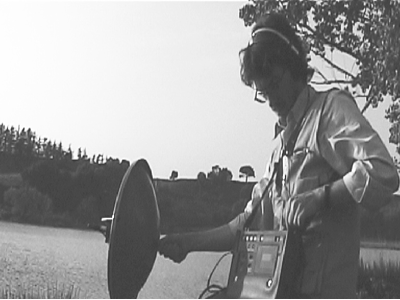By Jason Gross
Composer Joel Chadabe had founded the Electronic Music Foundation (EMF) in 1994 to promote and support electronic works in the modern classical field. While he worked tirelessly in this area, recording artists’ work and promoting concerts, he also came across another important obsession.
“A few years ago, it became apparent to me that we were collectively ruining our environment and that we were facing a life-or-death emergency situation. I can easily image the unimaginable connected to rising ocean levels, the destruction of habitats for animals and all the catastrophic effects of global warming. How can anyone not be interested?”
While it’s good and well to support environmental organizations, Chadabe decided to go a step further and try to do something on his own.
“The question was: what can we do as musicians? It was a natural connection to make between recording real world sounds for artistic purposes and recording real world sounds to engage people in environmental issues.”
So, early last year, he began planning programs based around these ideas, to get the public interested in the idea of ecology. The result is the Ear to the Earth Festival, which will include panels, installations, presentations, videos and concerts that revolve around issues like logging (“Calls of the Wild”), endangered/extinct species (“Suspended Sounds”) and global warming (“On Melting Ice”) at various venues in Lower Manhattan. Chadabe didn’t have to look far for participants, as he already knew several artists who had been thinking long and hard about ecology and conservation. Downtown Express asked several of the composers and artists involved in the festival how they saw a connection between their work and the idea of ecology.
• Andrea Polli (California digital media artist, participating in the “Water and Ice” and “Melting Ice” installations): “Since 2001, I’ve been collaborating with meteorologists and climatologists on translating data describing these natural systems into sound, a process called “sonification,” making a multi-channel aural representation of a hurricane, for example. It’s a different way to try to understand the forces of nature, through the ears.”
• Bruce Odland (New York sound artist, participating in the “Elevated Harmonies” installation): “Listening deeply to the culture (through sound) provides a counterpoint to the visual culture which has wreaked havoc on the environment. It’s possible that listening connects you to this same environment. My work as a composer is all about this connection, using the ears to reveal what the eyes obscure.”
• Annea Lockwood (New Zealand composer/writer/teacher, participating in “Water and Ice” installation): “I want to draw people into feeling immersed in soundscapes that I create, into feeling permeated by the Danube River, for example, because I know that then, all sense of separation from that environment falls away. When that happens, a deep comfort and sense of belonging in the natural world can emerge and with it.”
• Jean Claude Risset (French composer/researcher, participating in the “Ports of Call 1” concert): “I believe in an ecological point of view for hearing: our hearing has evolved to give us information on the environment that is useful for survival. Too often, music only exploits these capacities in a gratuitous way for our enjoyment.”
• Maggi Payne (California composer, participating in the “Extended Worlds” performance): “Underlying much of my work is the appreciation of nature and our need to preserve nature and to subtly remind everyone that we are an integral part of nature, not separate entities. I hope that my works will remind people of the beauty, power, and need to preserve the fragile ecosystems of the deserts and that we have a responsibility to this earth.”
As to the future of similar projects, Chadabe has ambitious plans. “We’re in the process of forming a worldwide network called Musicians for the Environment, aimed at encouraging people throughout the world to create environmental music based on recorded sounds. We’re going to do everything we can to encourage people to become sensitive to the world around them.”



























